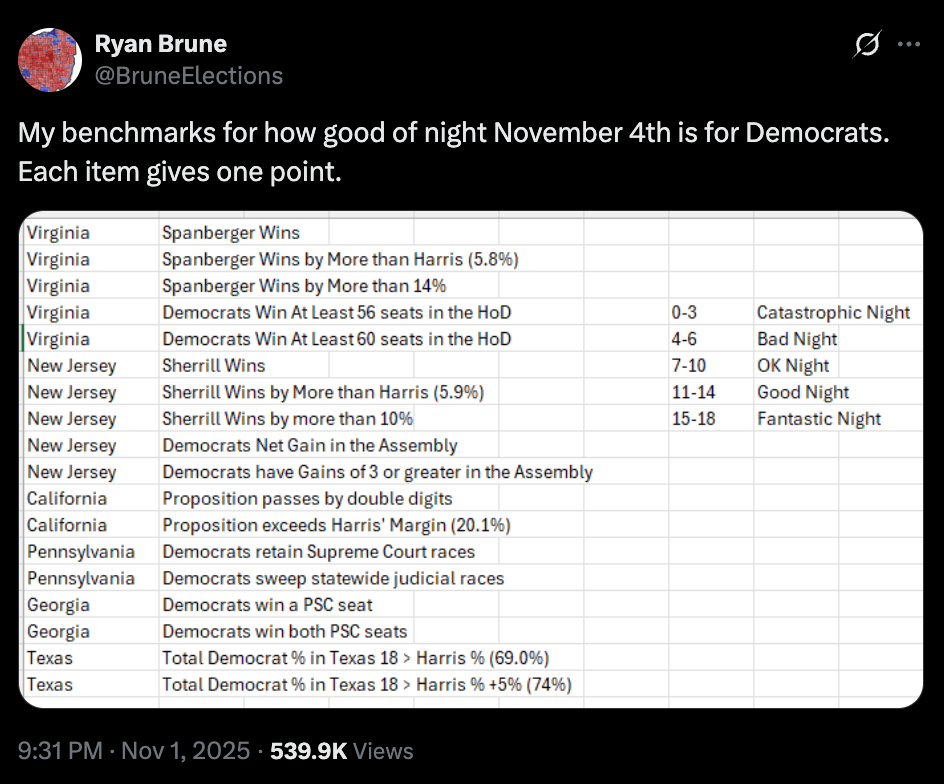This afternoon, Eli and I chatted with Ross Barkan of Political Currents. You can find the video above; as you can see, we all had different philosophies on how close to sit to the camera. Ross also experienced some audio problems midway through. But I think it was an excellent conversation. Ross is a native New Yorker who knows the city inside and out. Full disclosure: the then-obscure Zohran Mamdani was Ross’s campaign manager when he ran for office in 2018, but Ross is an excellent journalist, and that experience gives him a unique perspective on Zohran’s rise to political stardom. In the chat, we mainly focused on New York — how Mamdani won, how Andrew Cuomo failed so badly, and what New Yorkers can expect out of Zohran as mayor. So let me add a few comments about the rest of the night here.
On Saturday, the political analyst Ryan Brune published a series of benchmarks for Democrats in yesterday’s elections, which would indicate anything from a “catastrophic night” to a “fantastic night” for the party. I like this sort of thing because even though the predictive track record of off-year elections is far from perfect — Democrats had a fairly successful 2023, for instance, but it didn’t help them in 2024 — it at least establishes standards ahead of time instead of the spin wars that inevitably occur when people evaluate elections after the fact.
This is one of those nights, though, that was pretty spin-proof. How did Democrats do? According to Brune’s initial estimates — the results aren’t final anywhere yet — they achieved a perfect score of 18 out of 18.
Abigail Spanberger and Mikie Sherrill won the gubernatorial races in Virginia and New Jersey, respectively, by double-digit margins. As of this writing, Spanberger is ahead by 15 points and Sherrill by 13. Spanberger will become the first woman governor of Virginia, while Sherrill is the second in New Jersey history after Christine Todd Whitman.
Spanberger also helped drag the Democratic attorney general candidate, Jay Jones, across the finish line in Virginia, as Eli had suggested was likely to happen if Spanberger beat her polling averages, which she did. There was, by modern standards, a relatively large amount of ticket-splitting here — a 9-point gap between Spanberger and Jones. But Jones nevertheless had more than enough margin to overcome his texting scandal and beat incumbent AG Jason Miyares. Democrats also project to pick up at least 13 seats in the Virginia House of Delegates.
And in California, in the race that has the most direct implications for control of Congress next year, the Gavin Newsom-backed Proposition 50, which will allow Democrats to counteract Texas by aggressively redistricting several Republicans out of office, easily passed. California is slow to finalize its vote count, but Prop 50 currently leads by 28 points, larger than Kamala Harris’s margin in the state.
Of course, from my vantage point here in the East Village, the big news is that Mamdani will become the next mayor of New York. Mamdani’s margin against Andrew Cuomo is currently 9 points, and will likely come in below the polling averages. But it’s an unambiguously impressive win all the same for a 34-year-old1 Muslim-American and democratic socialist in a city that had actually been shifting in a more conservative direction in recent years.
Zohran will probably retain an outright majority once all ballots are tallied — he’s currently at 50.4 percent — in part because the vote for the Republican Curtis Sliwa collapsed to just 7 percent, perhaps because the Cuomo campaign heavily emphasized that voting for Sliwa was a wasted ballot. Sliwa’s poor finish, however, removes one further excuse from Cuomo backers who have tried to blame Sliwa for Cuomo’s defeat. The real problem, as I discussed with Ross and Eli, is that Cuomo ran a terrible campaign: amateurish, entitled, and often seemingly indifferent to the actual work of becoming mayor of the nation’s largest city.
Democratic infighting might not matter all that much for 2026
As you might have heard, Democrats like to argue with one another, particularly about whether the party ought to move in a more moderate or progressive direction. I don’t expect the fighting to stop even after a terrific Tuesday night for the party that should have given everyone from democratic socialists to centrists something to be happy about. There’s already been some weird and silly spin2 in downplaying the big margins achieved by Sherrill and Spanberger, relatively moderate candidates who are good fits for their suburban, center-left states. Sherrill, notably, showed a major rebound in Hispanic-heavy counties in New Jersey that had shifted away from Democrats in 2024.
But with the notable exception of Maine, all those arguments you see on Twitter, Bluesky and Substack might not matter very much for next year’s midterms. Democrats have nominated a string of mediocre presidential candidates, but they’re generally better than Republicans at picking candidates for local and statewide races that are good fits for their local electorates.
Plus, there’s the elephant in the room: Trump. His approval ratings have been plunging in our tracking and are currently a net negative 13, his lowest numbers of his second term to date.3
Some of this may be a short-term shutdown effect. Trump’s numbers were initially quite resilient during the shutdown. But they’ve worsened as the conversation has turned to SNAP benefits and the consequences of the shutdown have become clearer to voters.
The polls weren’t great. But for once, that isn’t good news for Republicans.
There’s also, just perhaps, a question of whether the polls are actually overestimating Trump after three presidential elections in a row where they lowballed him. Sherrill, in particular, outperformed her final polling averages by around 8 points in New Jersey. People tend not to get mad at the polls so long as they “call” the right winners. But the way we measure these things, 8 points is a huge miss: more than twice as large as the overestimation of Hillary Clinton in 2016, for example.
Indeed, Democrats have consistently met or exceeded their polls in the Trump Era in elections when Trump himself wasn’t on the ballot.
The distinction between “met” and “exceeded” is important to polling pedants like Eli and me; 2022, for instance, which was spun by some partisans as a big miss, was actually an extremely accurate year for polling.
Still, Democrats’ dominance among college-educated voters, if it causes problems for the party in presidential years, works great for them in elections with lower turnout where political engagement strongly predicts fundraising and turnout.
And keep in mind that most polls of presidential approval and the generic congressional ballot are, at this point, conducted among registered voters or all adults, rather than likely voters. The “enthusiasm gap” in midterm elections can be large. In 2010, for instance, Republicans performed about 6 points better in polls of likely voters compared with polls of registered voters, turning what was already likely to be a fairly bad election for Democrats into a catastrophe.
But at least for one night, Democrats had none of the usual worries about “shy Trump voters” or coming out on the losing end of razor-thin margins in swing states. It’s still probable that the conventional wisdom will overstate the predictive power of last night. But when you see consistent results like this from different sorts of Democrats in different sorts of elections all performing strongly, it suggests that Democrats head into next year’s midterms with considerable upside.
Though Mamdani will not be the youngest mayor in NYC history; that honor belongs to Hugh Grant, who was first inaugurated at age 30.
Trump’s first-term numbers were worse at this point, but only slightly.











